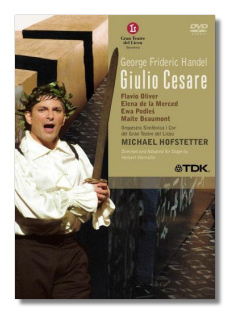
The Internet's Premier Classical Music Source
Related Links
- Handel Reviews
- Latest Reviews
- More Reviews
-
By Composer
-
Collections
DVD & Blu-ray
Books
Concert Reviews
Articles/Interviews
Software
Audio
Search Amazon
Recommended Links
Site News
 DVD Review
DVD Review
George Frideric Handel

Giulio Cesare, HWV 17
- Flavio Oliver (Cesare)
- Elena de la Merced (Cleopatra)
- Ewa Podleś (Cornelia)
- Maite Beaumont (Sesto)
- Jordi Domènech (Tolomeo)
Symphony Orchestra and Chorus of the Gran Teatre del Liceu, Barcelona/Michael Hofstetter
TDK DVWW-OPGCES 2DVDs: 216min DTS 5.1 Dolby Digital LPCM Stereo
Those who are looking for a traditional production of one of Handel's greatest operas are advised to stay clear of this release. Director Herbert Wernicke, who also designed the sets and the costumes, has turned Giulio Cesare into archaeological fantasy: the entire opera takes places on top of a giant replica of the Rosetta Stone, and the final chorus is sung by camera-clicking tourists. (Shades of Philip Glass's Akhnaten!) Achilles, Ptolemy's general, is dressed like Indiana Jones's less svelte brother, and throughout the course of the production we see, at different times, dresses and uniforms that could have been worn in the century just past, powdered wigs that could have been worn in the 1700s, and a man (fortunately silent!) in a crocodile costume, who apparently represents the spirit of Egypt. In principle, I have nothing against updating an opera's action – let's have a Madama Butterfly set on Mars in the 23rd century! – but the willful inconsistency exhibited in this production doesn't serve any useful purpose, as far as I can tell, except to distance the opera from the spectator.
Supposedly this production, like the opera itself, emphasizes emotion over action, but it is hard to feel anything in particular for these characters. One of the cardinal sins in opera has been committed here, and this is to distract the audience from the musical center of attention. Hardly an aria can be sung without Wernicke moving props or scenery or creating busy-work elsewhere on the stage. For example, in Act One, as Cleopatra is singing "Tu la mia stella sei," Caesar is wrangling the crocodile. As beautiful as this aria is, the spectacle of a Roman emperor teasing a man in a crocodile suit ends up taking precedence. Wernicke's attempts at wry humor feel inappropriate and gratuitous. Furthermore, there's much that is in bad taste too. Cornelia spends the opera walking around with her husband's (not terribly convincing, fortunately) severed head. In Act Three, when Ptolemy's head is severed from Ptolemy's body, the severed head sings Ptolemy's last aria - through a hole in the stage, of course. (One wonders if Wernicke knows Michael Powell's film of The Tales of Hoffmann.) The production is full of questionable details such as these. To make matters worse, Wernicke has "adapted" the opera by taking out several arias and adding arias from different operas: Rinaldo, Orlando, and Tolomeo. This is not a Giulio Cesare that Handel would have recognized.
Musically, things are in better shape. Ewa Podleś is the only big name in the cast, and after a somewhat hollow sounding "Priva son d'ogni conforto" she gives Cornelia her best, in spite of the matronly costume and wig she has been given. As her son Sextus, Maite Beaumont sings brilliantly, and her duets with Podles are memorable and moving. Elena de la Merced's Cleopatra, while not as sparkling as that of many of her predecessors, is sweetly, cleanly, and confidently sung. The two countertenors, Oliver and Domènech, are almost of the same level, although neither can summon up a wide range of vocal color. (Domènech is at his best in his plaintive "severed head" aria.) The other singers are acceptable. Hofstetter's direction is lively, but rather businesslike, and as with some of the singing, restricted in color. Modern instruments are used, but a nod is made in the direction of historically authentic playing.
The English subtitles are acceptable, although I was amused by their insistence on "Cesar," and also by the use of the exclamation "Hey!" on at least two occasions. The audio (in the three usual formats) is very good, but there is a lot of thudding around on stage. The video (Anamorphic Widescreen) is good too, with one exception: the character of Nireno frequently walks on stage holding large signs – don't ask me why – and not once does the camera move close enough to him/her to reveal what is written on them.
There's a Giulio Cesare from Australia on DVD which I haven't seen, so I am hesitant to recommend it over this one. Suffice it to say that Wernicke's ideas about this opera neither involved nor enlightened me, although the singing certainly was enjoyable, most of the time.
Copyright © 2006, Raymond Tuttle




















